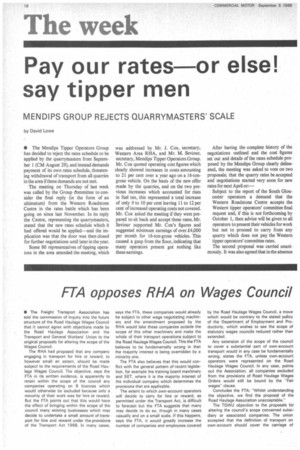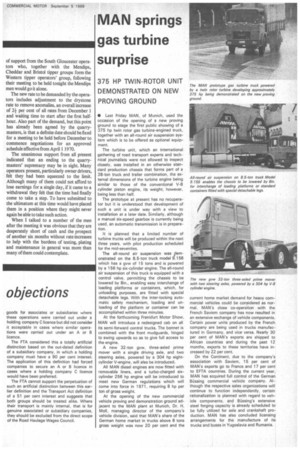FTA opposes RHA on Wages Council objections
Page 20

Page 21

If you've noticed an error in this article please click here to report it so we can fix it.
• The Freight Transport Association has told the commission of inquiry into the future structure of the Road Haulage Wages Council that it cannot agree with objections made by the Road Haulage Association and the Transport and General Workers Union to the original proposals for altering the scope of the Wages Council.
The RHA had proposed that any company engaging in transport for hire or reward, to however small an extent, should be made subject to the requirements of the Road Haulage Wages Council. The objective, says the FTA in its written evidence, is apparently to retain within the scope of the council any companies' operating on 13 licences which would otherwise be excluded because only a minority of their work was for hire or reward. But the FTA points out that this would have the effect of bringing within the scope of the council many existing businesses which may decide to undertake a small amount of transport for hire and reward under the provisions of the Transport Act 1968. In many cases,
says the FTA, these companies would already be subject to .other wage negotiating machinery and the amendment proposed by the RHA would take these companies outside the scope of this other machinery and make the whole of their transport operations subject to the Road Haulage Wages Council. This the FTA believes to be fundamentally wrong in that the majority interest is being overridden by a minority one.
The FTA also believes that this would conflict with the general pattern of recent legislation, for example the training board machinery and SET, where it is the majority interest of the individual company which determines the provisions that are applicable.
The extent to which own-account operators will decide to carry for hire or reward, as permitted under the Transport Act, is difficult to forecast but the FTA suggests that many may decide to do so, though in many cases casually and on a small scale. If this happens, says the FTA, it would greatly increase the number of companies and employees covered by the Road Haulage Wages Council, a move which would be contrary to the stated policy of the Department of Employment and Productivity, which wishes to see the scope of statutory wages councils reduced rather than extended.
Any extension of the scope of the council to cover a substantial part of own-account transport would in any case be fundamentally wrong, states the FTA, unless own-account operators were represented On the Road Haulage Wages Council. In any case, points out the Association', all companies excluded from the provisions of Road Haulage Wages Orders would still be bound by the "Fair wages" clause.
Concludes the FTA: "Whilst understanding the objective, we find the proposal of the Road Haulage Association unacceptable."
The TGWU objection to the proposals for altering the council's scope concerned subsidiary or associated companies. The union accepted that the definition of transport on own-account should cover the carriage of
goods for associates or subsidiaries where these operations were carried out under a holding company C licence but did not consider It acceptable in cases where similar operations were carried out under an A or 8 licence.
The FTA considered this a totally artificial distinction based on the out-dated definition of a subsidiary company, in which a holding company must have a 90 per cent interest. The application of this definition had forced companies to secure an A or B licence in cases where a holding company C licence would have been preferred.
The HA cannot support the perpetuation of such an artificial distinction between this earlier definition and the Transport Act definition of a 51 per cent interest and suggests that both groups should be treated alike. Where their transport is mainly internal, that is for genuine associated or subsidiary companies, they should be excluded from the direct scope of the Road Haulage Wages Council.






















































































































